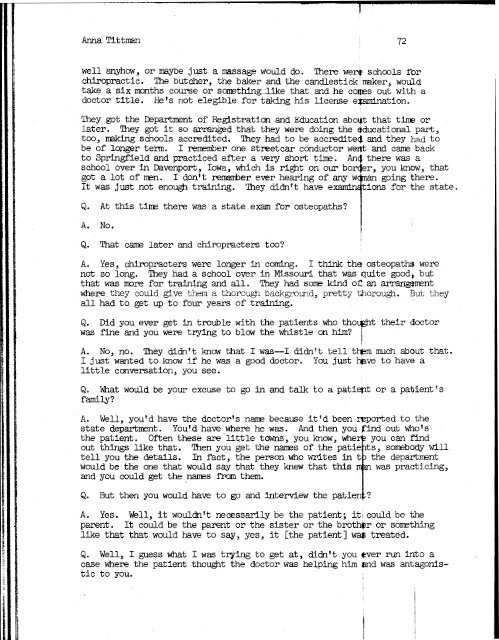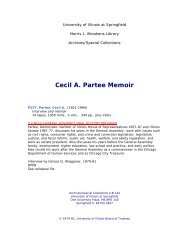Anna Louise Tittman Memoir - University of Illinois Springfield
Anna Louise Tittman Memoir - University of Illinois Springfield
Anna Louise Tittman Memoir - University of Illinois Springfield
Create successful ePaper yourself
Turn your PDF publications into a flip-book with our unique Google optimized e-Paper software.
<strong>Anna</strong> Tittram 72<br />
well anyhow, or maybe just a msage would do. There wen$ schools fbr<br />
chiropractic. The butcher, the baker and the candlestick~rraker, would<br />
take a six mnths course or something like that and he cops out with a<br />
doctor title. He's not elegible for takhg his license ep.mlnation.<br />
They got the Ikpartment <strong>of</strong> Registration and Education abol)t that th or<br />
later. They got it so arranged that they were doing the 4ducational part,<br />
too, making schools accredited. They had to be accredLte4 and they had to<br />
I rermnber one streetcar conductor went and came back<br />
be <strong>of</strong> longer term.<br />
to <strong>Springfield</strong> and practiced after a very short tim<br />
school over in Davenport, Iowa, which is right on o<br />
got a lot <strong>of</strong> En. I don't remer ever hearing o<br />
It was just not enough training. They didn't have e<br />
Q. At this tim there was a state exam for osteopaths? I<br />
A. No.<br />
Q. That cam later and chi~opmcters too?<br />
A. Yes, chimpracters were longer in coming. I thhk thq osteopath@ were<br />
not so long. They had a school over in I'tissouri that was quite good, but<br />
that was more for trainin@; and all. They had some kind o# an arrmgqmnt<br />
where they could give them a thorough background, pretty thorough. But they<br />
all had to get up to four years <strong>of</strong> training.<br />
4. Did you ever get in trouble with the patients who tho their doctor<br />
was fine and you were trying to blow the whistle on him?<br />
A. No, no. They didn't know that I was-I didn't tell twm much about that.<br />
I just wanted to know if he was a good doctor. You just wve to have a<br />
little conversation, you see.<br />
Q. What would be your excuse to go in and talk to a patiqt or a patient's<br />
family?<br />
A. Well, you'd have the doctor's name because it 'd been reported to the<br />
state depart~nt. You'd have where he was. And then you rind out who's<br />
the patient. Often these are ' lit$ le towns, you know, can find<br />
out things like that. Then you get the nams <strong>of</strong> the<br />
will<br />
tell you the details. In fact, the person who mtes<br />
would be the one that would say that they knew that this was practicing,<br />
and you could get the names fkom them.<br />
Q. But then you would have to go and interview the patient?<br />
A. Yes. Well, it wouldn't necessa,rily be the patfent; it! could be the<br />
parent. It could be the parent or the sister or the brother or somthing<br />
like that that would have to say, yes, it [the patient] wa$ treated.<br />
Q. Well, I guess what I was trying to get at, didn't you ever ma? into a<br />
case where the patient thowt the doctor was helping him @nd was antagonistic<br />
to you.<br />
I<br />
I
















